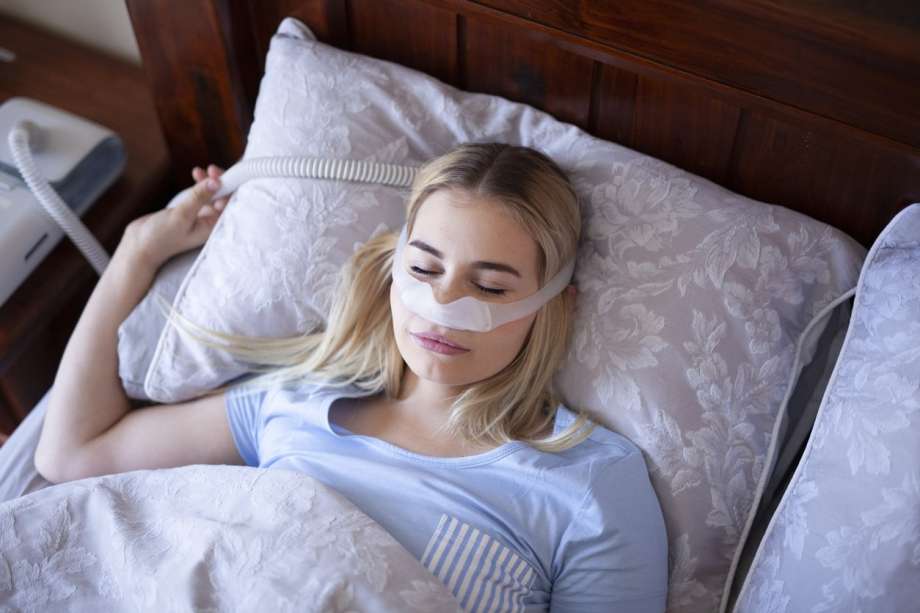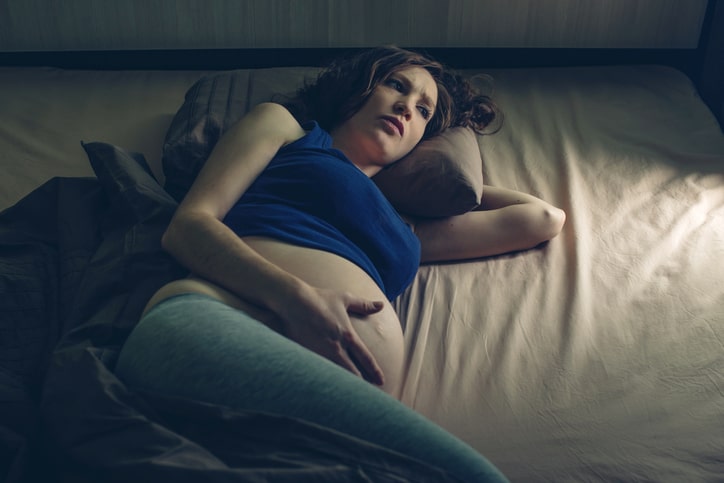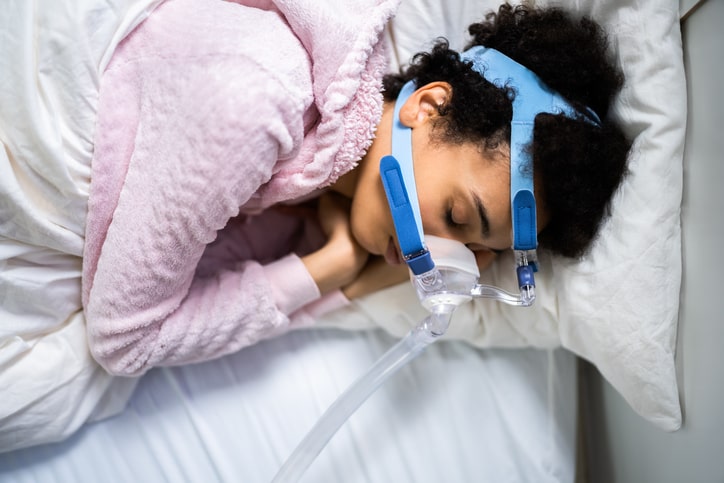Pregnancy and Sleep Apnea: Safety Tips for You and Your Baby

Getting sleep when you’re pregnant is already hard enough with your aching muscles, rapidly expanding belly and multiple bathroom trips in the middle of the night.
But when you’re pregnant with sleep apnea, getting a good night’s sleep may feel like a nightmare.
Sleep apnea and breathing problems when you sleep can impact anyone, but dealing with sleep apnea when you’re pregnant can take a toll on your physical and mental health and that of your growing baby.
Related: The Best Pregnancy Pillows According to Real Moms
Whether you’re already diagnosed with sleep apnea or suspect the sleep disorder may be causing your bedtime troubles and drowsiness, we’ve got the important info on treating sleep apnea during pregnancy.
Understanding Sleep Apnea Symptoms and Risks
Sleep apnea is a disorder where someone’s breathing will start and stop when they sleep. People with sleep apnea often experience loud snoring, waking during the night, mood changes and gasping or choking while asleep.
When left untreated, sleep apnea may get worse and lead to serious health concerns like high blood pressure, heart attacks and Type 2 diabetes.
The two primary types of sleep apnea are obstructive sleep apnea and central sleep apnea.
Obstructive sleep apnea (OSA) is the most common form of the disorder. OSA occurs when the throat muscles relax during sleep. This causes a blockage that makes it difficult for air to flow of airflow into the lungs.
Central sleep apnea (CSA) differs from OSA in that the brain stops sending signals to the muscles that help to control breathing while you’re sleeping.
Common Causes of Sleep Apnea
While anyone can have sleep apnea, the condition is more common in older people (particularly men), people who are overweight or obese and anyone who routinely smokes or uses substances like alcohol, sedatives or tranquilizers.
Changes in hormone levels and weight gain can also trigger sleep apnea – and unfortunately, both of these triggers are associated with pregnancy.
Sleep-disordered breathing (SDB) is common — especially during pregnancy. According to a 2017 literature review published in the journal Sleep Medicine Reviews, between nine and 38 percent of the general population have this condition.
Relationship Between Pregnancy and Sleep Apnea?
Why are pregnant women at higher risk for sleep apnea?
The risk factors for obstructive sleep apnea include hormonal changes, family history, cardiovascular or kidney disease and obesity according to the National Heart, Lung, and Blood Institute.

A study published in the journal Thorax found that women in their third trimester of pregnancy were at more of an increased risk for developing OSA than those in their first trimester.
-
BMI increases during pregnancy
A high baseline body mass index or BMI and weight gain during pregnancy may also add to the issue. A 2017 study also found that neck circumference and gestational age could also put pregnant women at risk for obstructive sleep apnea.
-
Your expanding uterus puts pressure on your lungs
Throughout the entirety of your pregnancy, your uterus grows to accommodate your baby. As the uterus gets bigger, it can put pressure on your lungs which impacts your overall breathing capacity.
-
Pregnancy hormones cause changes in your brain
You may already feel the emotional rollercoaster-like results of hormonal changes during pregnancy. But the increase in hormones such as estrogen and progesterone won’t just affect your feelings.
The UT Southwestern Medical Center reports that an influx of progesterone can stimulate receptors in the brain that influence breathing and affect your oxygen levels—also known as desaturation.
-
Rising estrogen levels raise mucous production
The rise in estrogen during pregnancy can cause swelling and narrowing of the nasal passages. It can also lead to increased mucous production.
This becomes a risk factor for OSA. According to a research review published in the Journal of the American Board of Family Medicine (JABFM), changes that cause constriction of the upper airway can result in increased airflow resistance.
Effects of Obstructive Sleep Apnea on Pregnancy
Changes in sleep patterns, most often lack of sleep, are the most obvious way that SDB or OSA affects pregnant women. Your growing baby and other physical changes that happen during pregnancy can already make getting a good night’s rest tricky.
OSA can take your pregnancy-related brain fog up a notch or a few. The fogginess can make it harder for you to work, care for your other children or do just about anything else.
Common symptoms of sleep apnea and pregnancy can include:
- Extreme daytime fatigue
- Dry mouth
- Sore throat
- Headaches after waking up
- Irritability
- Difficulty concentrating
- Higher risks of chronic stress and depression
Sleep Apnea and High-Risk Pregnancies
The American Thoracic Society also notes that OSA can also increase the risk of developing high blood pressure, preeclampsia and gestational diabetes. Gestational hypertension, hypertensive disorders and gestational diabetes are potentially serious pregnancy complications.
A study from the Journal of Obstetrics and Gynaecology Canada found that women with OSA were more likely to have a postpartum hemorrhage, infection, wound complications, cardiomyopathy or need a blood transfusion after having a cesarean section.
Sleep Apnea Effects on the Health of Your Baby
Along with effects on the mother, sleep-disordered breathing and OSA can also impact the baby. Maternal hypoxemia and gestational hypertension in women with preeclampsia and SDB can disrupt or decrease fetal growth.
Likewise, research published in the journal Obstetrics and Gynaecology found that the babies of the study participants with OSA had lower birth weights and lower Apgar scores than the babies of the women without SDB.
Treatment Options for Obstructive Sleep Apnea In Pregnancy
Before you can treat OSA, you need a diagnosis. Your gynecology provider can evaluate your symptoms.
Getting Diagnosed with Sleep Apnea
Some women may need to do a sleep study – known as polysomnography – to diagnose their sleep apnea. Polysomnography is done at a sleep center or as an in-patient in a hospital setting.
The sleep study allows the medical team to monitor the stages and cycles as you rest. This helps the sleep specialist diagnose sleep apnea or other SDB issues in high-risk patients.
As part of an evaluation, your obstetrician may also examine your neck circumference, take your blood pressure, check your blood oxygen levels and heart rate and weigh you.
Using a CPAP Machine During Pregnancy

If you are diagnosed with sleep apnea, your health care provider or sleep specialist may recommend a continuous positive airway pressure (CPAP) machine. This is a common treatment option for OSA.
As the name implies, a CPAP machine puts continuous pressure on the airway. This keeps the airway open and can make it easier to breathe, reduce loud snoring and return your healthy airflow.
A 2022 research review in the journal Sleep Science noted that CPAP use in pregnant women could help to decrease OSA-related high blood pressure in participants with gestational hypertension or preeclampsia. The same review also found that research points to a positive connection between infant Apgar scores at birth, fetal movement and CPAP use during pregnancy.
Managing Weight Gain Before and During Pregnancy
Along with CPAP use, your healthcare provider may suggest other ways to reduce the effects of OSA during pregnancy. While weight gain is a normal and necessary part of a healthy pregnancy, women with a high baseline BMI or those who already struggle with obesity may need to change or monitor their eating habits.
Women who are also diagnosed with gestational diabetes mellitus, hypertensive disorders, gestational hypertension or other similar complications may need additional treatment options that go beyond a CPAP machine.
These pregnancy-related issues may require follow-up appointments with the medical provider, prescription medications, or significant lifestyle changes. Always consult your doctor or gynecology provider before making dietary or nutritional changes during pregnancy or in the postpartum period.
Tips for Better Quality Sleep When You’re Pregnant
You want to get the most rest possible during pregnancy. But SDB can make it a challenge to sleep at night. While a CPAP machine should help, other ways to get a better night’s sleep include:
-
Find the best sleep position possible
Sleeping on your side can increase circulation. If you’re finding it hard to sleep in a certain position or aren’t sure which option is the best one to help, talk to your OB or sleep specialist.
-
Stop screen time before bed
Don’t look at your phone, laptop or tablet in the hour before your bedtime because the light from these devices has been known to impact your circadian rhythm and lower sleep quality. Put all electronics far enough from you at night, so you won’t be tempted to scroll while in bed.
-
Consult with a doctor for sleep medications and treatments
If your doctor recommends CPAP use, has prescribed medication to help with related issues, or recommends lifestyle changes, listen and follow their guidance.
See our article Pregnancy Fatigue and How to Deal with Exhaustion for more tips on dealing with fatigue and sleep troubles during pregnancy.

